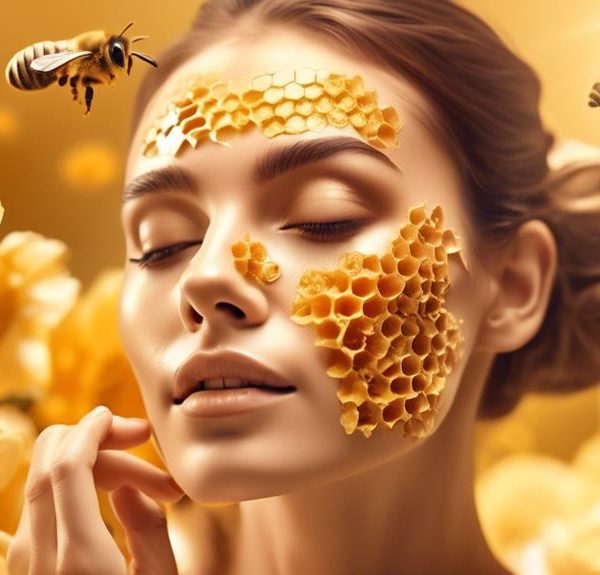Can bees turn fiery peppers into a spicy, sweet nectar? Discover the fascinating world of bee behavior and honey production.
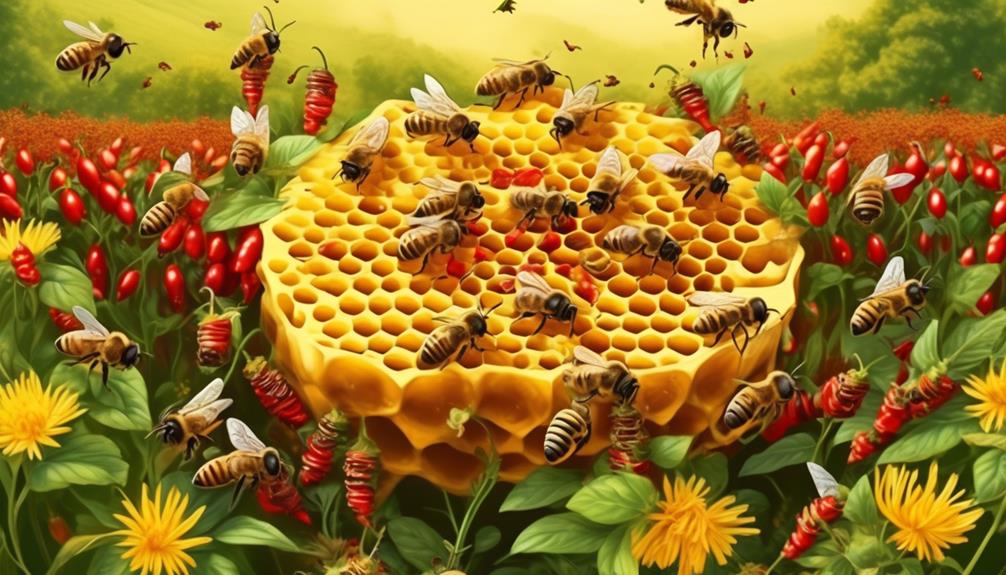
Can Bees Make Spicy Honey?
Imagine you're a medieval apothecary, curating a collection of honey, a sweet elixir known for its healing properties. Fast forward to the 21st century, and you're still fascinated with honey, but now you're curious about a new twist – spicy honey.
You've seen bees flit from flower to flower, but can their interaction with spicy plants result in a fiery nectar? It's an intriguing question that prompts an exploration of bee behavior, the complexity of their pollination process, and the science behind honey production.
The answer to the question could expand your understanding of these industrious little insects and the sweet, golden syrup we so enjoy.
Key Takeaways
- Bee pollination is essential for a lush and vibrant ecosystem.
- The process of honey production involves bees collecting nectar, breaking it down, and concentrating it into honey.
- Bees can interact with certain spices, resulting in subtly spiced honey.
- Experimenting with spicy nectar can lead to unique, health-boosting honey flavors.
Understanding Bee Pollination
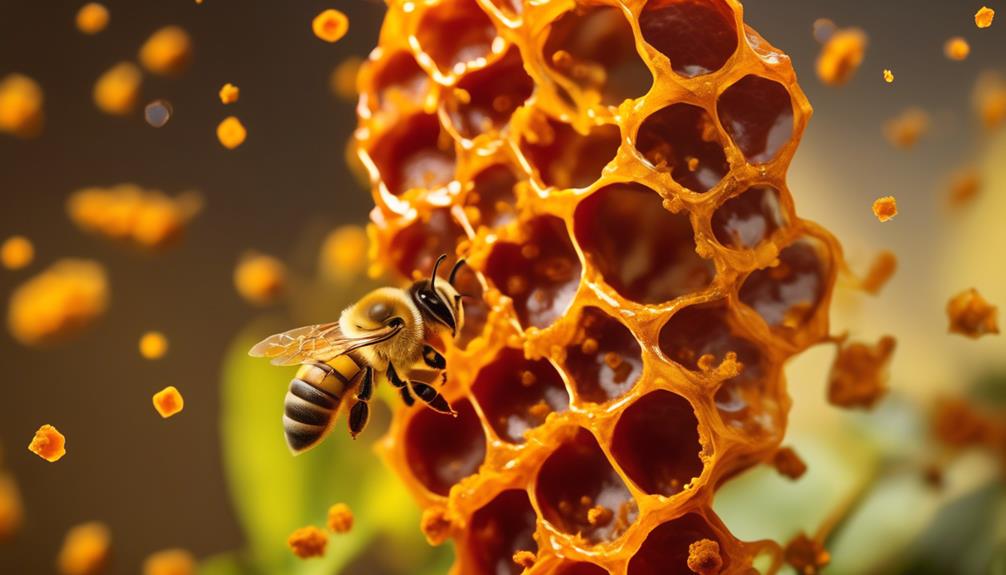
To truly appreciate the marvel of spicy honey, you've got to grasp the intricate dance of bee pollination, a process that's as fascinating as it's vital to our ecosystem. It's not just about bees buzzing around collecting nectar. It's about the exchange of life, the silent and unseen transactions that make our world lush and vibrant.
Imagine, each bee, a tiny pollinator, gathering nectar from flowers and in return, dusting off pollen grains adhering to their fuzzy bodies. This pollen is then transferred to the next bloom visited, leading to fertilization. It's this pollen that gives honey its unique flavors, including the tantalizing spicy kick you've come to adore.
While bees are on this vital mission, they become unwitting chefs, creating a delicacy that has the power to surprise your palate. The nectar, stored in their honey stomach, is mixed with enzymes that transform it into honey. If the bee has feasted on spicy plants, the nectar and thus the honey carry that flavor.
The Science Behind Honey Production
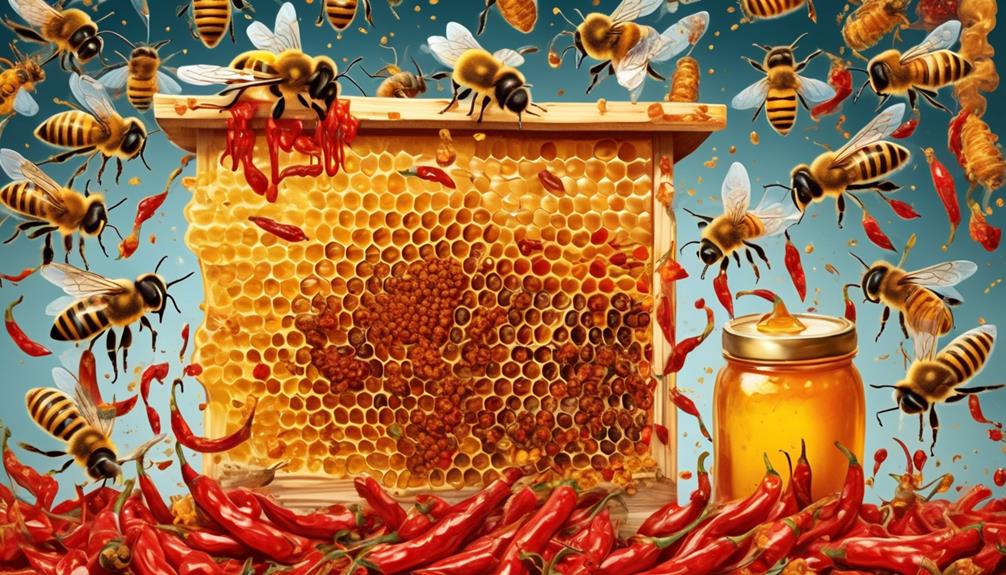
Building on the complex dance of pollination and the bee's foray into spice, let's explore the scientific intricacies that turn nectar into the enchanting sweetness of honey. This transformation is a result of an intricate process that's both captivating and fascinating.
When bees collect nectar from flowers, it's stored in a special stomach, their 'honey stomach'. Here, the nectar mixes with enzymes that break down its complex sugars into simpler ones, a process known as inversion. Once back at the hive, bees regurgitate the nectar for house bees to further break it down.
But it's not honey yet. The bees then evaporate the excess water by fanning their wings, concentrating the nectar into a thicker syrup. The hive's warm environment aids this process, and once the water content is below 20%, the nectar becomes honey. Bees seal the honeycomb with a wax capping, preserving the honey for later use.
The magic behind honey production is truly awe-inspiring. It's a testament to the intricate, industrious, and intelligent world of bees. So next time you drizzle honey onto your morning toast, remember the diligent bees and their remarkable alchemy that brought it to your table.
Spices and Bee Interaction
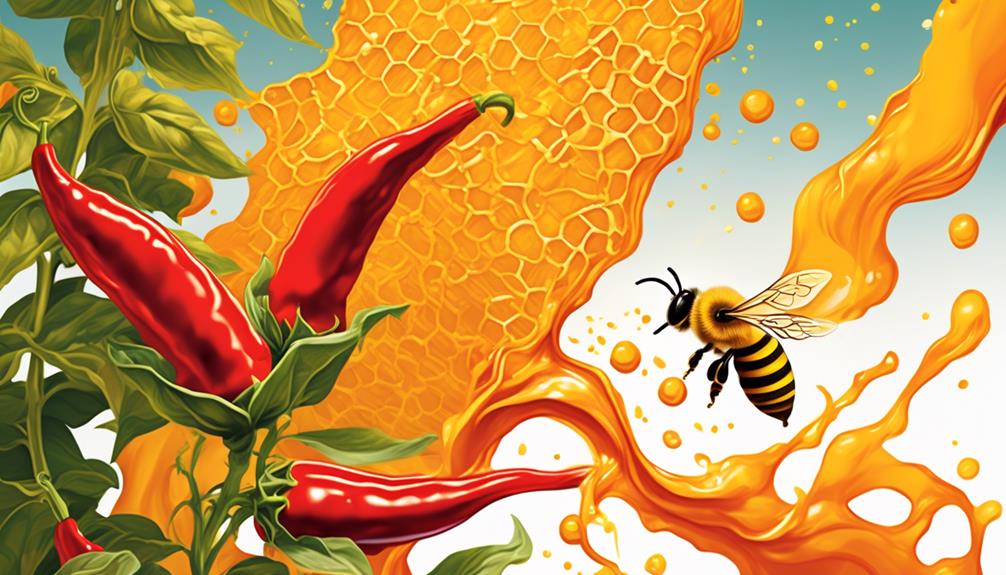
Now, let's delve into the fascinating interaction between bees and spices, a unique relationship that not only influences the flavor of the honey, but also impacts the overall health and productivity of the hive.
You might be surprised to learn that bees can be attracted to certain spices, such as cinnamon and coriander, which they then incorporate into their nectar collection. This can result in subtly spiced honey, a true culinary delight.
Not only that, some spices can have health benefits for the bees themselves. For instance, thyme has been found to increase bees' resistance to certain diseases, while lemongrass can help attract bees to a new hive. So, it's not just about the flavor; it's about creating a healthier, more productive bee colony.
In a world where bees are increasingly under threat, it's vital that we understand the full potential of these interactions. By encouraging bees to interact with beneficial spices, we couldn't only enhance the flavor of our honey but also protect these precious pollinators. It's a win-win situation, and it all starts with understanding the beautiful dance between bees and spices.
Experimenting With Spicy Nectar
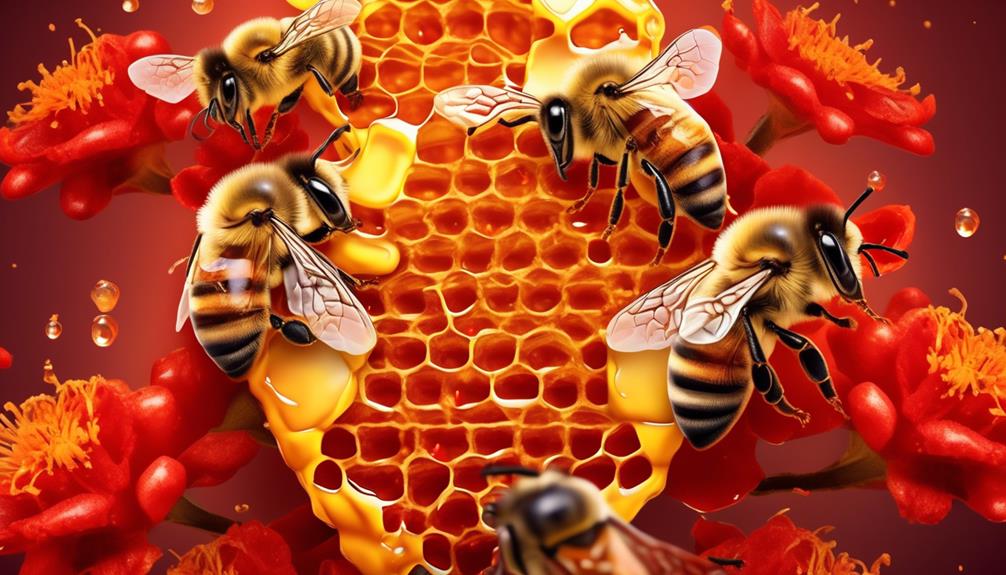
Given the intricate dance of bees and spices, it's worth considering how you might experiment with spicy nectar yourself to create unique, health-boosting honey. Start by deciding on a spice that's friendly to bees. Capsaicin, the substance that gives peppers their heat, is one option. It's non-toxic to bees and they can transport it back to the hive without any adverse effects.
You'd then need to create a nectar substitute using sugar, water, and your chosen spice. The idea is to replicate the sweetness of real flowers while introducing the desired spiciness. It's a delicate balance. Too much spice might deter bees, while too little won't produce the desired effect.
Next, introduce your spicy nectar to the bees. This can be done by placing it near the hive or in a feeder. Monitor the bees' interactions with the nectar closely. Are they accepting it? Are they able to process it into honey within the hive?
Ultimately, your success in this experiment can lead to a whole new frontier of flavor in honey production. Keep in mind that this is a delicate process requiring patience and precision. But the potential rewards? A spicy, health-boosting honey unlike any other.
Unveiling the Spicy Honey Mystery
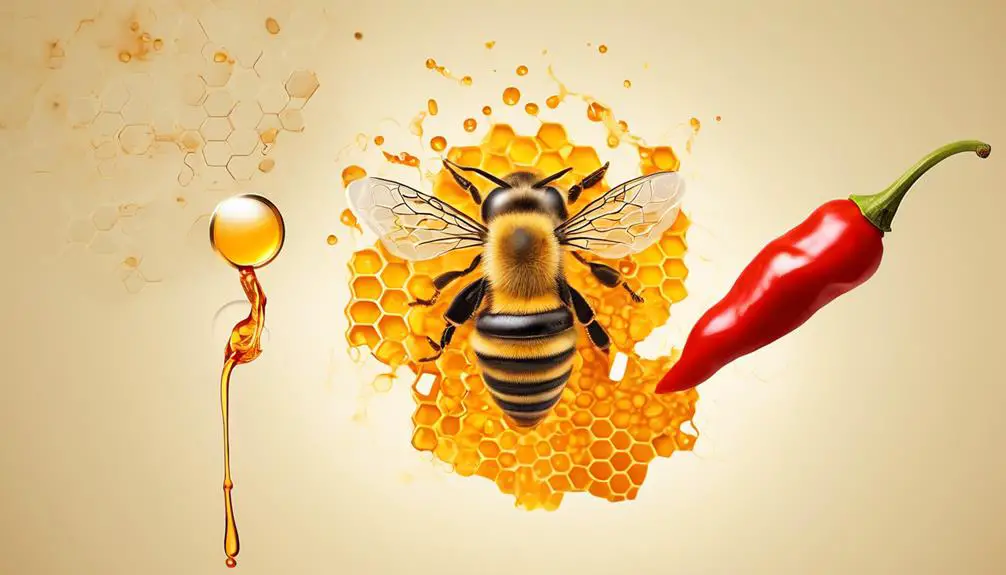
In the pursuit of understanding the spicy honey enigma, you'll find yourself immersed in a world of buzzing bees, intriguing flavors, and unexpected health benefits.
The truth is, bees can't directly make spicy honey. However, they can produce honey with a kick if they collect nectar from spicy plants like chilli peppers or spicy herbs. It's nature's way of adding a little zest to your honey jar!
Let's dig deeper. You'll find that bees have a fantastic ability to retain the flavor of the plants they visit. This flavor retention in honey is what makes it a unique product. So, when bees collect nectar from a spicy plant, the resulting honey will carry that spice's essence. Sounds amazing, right?
But there's more. This spicy honey isn't just about the exciting twist in taste. It's also packed with health benefits. From aiding digestion to boosting your metabolism, spicy honey's got you covered. So, not only do you get to enjoy a fiery taste, but you also get to reap some health benefits.
Truly, unraveling the spicy honey mystery is a journey full of delicious surprises!
Frequently Asked Questions
What Is the Nutritional Value of Spicy Honey?
You're curious about the nutritional value of spicy honey, aren't you? Well, it's packed with antioxidants, enzymes, and minerals like potassium, calcium, and magnesium.
The added spices, like chili, can boost your metabolism. However, it's high in sugar, so moderation's key.
Plus, it's a delicious, natural sweetener. So, spice up your tea or drizzle it on toast.
You'll enjoy the kick and reap the health benefits.
Are There Any Specific Types of Bees That Are More Inclined to Create Spicy Honey?
No, there aren't specific types of bees that are more inclined to create spicy honey. It's not the bees, but the nectar source that influences honey's flavor.
If bees collect nectar from plants with a spicy profile, the honey could potentially have a spicy undertone. However, this isn't common as bees typically prefer sweet over spicy nectar.
Are There Any Potential Health Risks Associated With Consuming Spicy Honey?
You're probably wondering about potential health risks of consuming spicy honey.
Generally, it's safe to eat, unless you're allergic to honey or spices.
However, if you've a sensitive stomach, spicy foods could cause discomfort.
Also, excessive consumption might elevate blood sugar levels.
As with any food, moderation's key.
If you're unsure, it's always best to consult your doctor before making it a regular part of your diet.
Is Spicy Honey Commercially Available or Can It Only Be Produced in a Controlled Environment?
Yes, you can buy spicy honey commercially. It's usually regular honey infused with chili peppers to give it a kick.
However, it's not typically produced by bees in nature. Companies create it in a controlled environment, ensuring the right balance of sweetness and heat.
Are There Any Specific Spices That Can Be Harmful to Bees During Pollination?
Yes, certain spices can harm bees. For instance, cinnamon can interfere with their sense of smell, hampering their ability to find flowers.
Cloves are toxic to bees, and too much black pepper can be harmful.
It's important to remember that while you might enjoy a spicy kick, it's not necessarily healthy or safe for bees.
Always consider the impact on these crucial pollinators when introducing new plants to your garden.
Conclusion
So, can bees make spicy honey? Not directly. Bees can't process spicy compounds like capsaicin from peppers.
But you can experiment by introducing spicy plants in your garden. Bees might pick up subtle flavors, though not the heat.
It's your love for these industrious insects that will spice up their honey-making journey. Continue exploring and experimenting, and you could stumble upon your own unique honey flavor.


